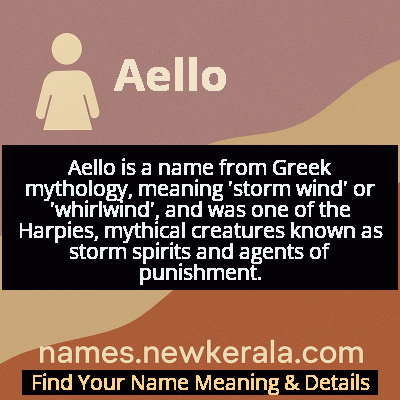Aello Name Meaning & Details
Origin, Popularity, Numerology Analysis & Name Meaning of Aello
Discover the origin, meaning, and cultural significance of the name AELLO. Delve into its historical roots and explore the lasting impact it has had on communities and traditions.
Name
Aello
Gender
Female
Origin
Greek
Lucky Number
9
Meaning of the Name - Aello
Aello is a name from Greek mythology, meaning 'storm wind' or 'whirlwind', and was one of the Harpies, mythical creatures known as storm spirits and agents of punishment.
Aello - Complete Numerology Analysis
Your Numerology Number
Based on Pythagorean Numerology System
Ruling Planet
Mars
Positive Nature
Generous, passionate, energetic, and humanitarian.
Negative Traits
Impulsive, impatient, moody, and can be overly emotional.
Lucky Colours
Red, maroon, scarlet.
Lucky Days
Tuesday.
Lucky Stones
Red coral, garnet.
Harmony Numbers
1, 2, 3, 6.
Best Suited Professions
Military, sports, philanthropy, leadership roles.
What People Like About You
Courage, energy, leadership, generosity.
Famous People Named Aello
Aello (Mythological)
Mythological Harpy
One of three harpy sisters who personified storm winds and served as agents of divine punishment
Aello (Literary Character)
Fictional Character
Appears in various fantasy novels and mythological retellings as a powerful wind spirit
Aello (Art Reference)
Artistic Subject
Featured in numerous artworks depicting Greek mythology and harpy symbolism
Name Variations & International Equivalents
Click on blue names to explore their detailed meanings. Gray names with will be available soon.
Cultural & Historical Significance
Extended Personality Analysis
Individuals bearing the name Aello typically exhibit personality traits reflecting their mythological origins as storm personifications. They often demonstrate intense emotional depth combined with intellectual sharpness, creating a formidable presence that commands attention. Aellos tend to be natural leaders who embrace change and transformation, viewing life's challenges as opportunities for growth rather than obstacles. Their personalities frequently include a strong independent streak, resistance to conformity, and a willingness to challenge established norms—qualities that can make them appear disruptive but often lead to innovative thinking and meaningful change. Like the storm winds they're named after, Aellos may have unpredictable moods and intense passions, but they also possess remarkable resilience and adaptability. They typically value freedom above all else and may struggle with situations that feel restrictive or confining. Their strength lies in their ability to weather emotional storms while maintaining their core identity, and they often serve as catalysts for transformation in their personal and professional relationships. While they can be fiercely protective of those they care about, they also require significant personal space and independence to thrive.
Modern Usage & Popularity
In contemporary naming practices, Aello remains an exceptionally rare choice, primarily favored by parents with strong interests in Greek mythology, classical studies, or those seeking uniquely powerful names for their daughters. According to available birth records, the name appears fewer than five times annually in most English-speaking countries and has never ranked in the top 1000 names in the United States. However, it has gained some traction in specific subcultures, particularly among fantasy literature enthusiasts and within communities that value mythological names. Modern usage often emphasizes the name's connection to wind, freedom, and transformation rather than the more negative harpy associations from classical mythology. The name appeals to parents looking for strong, distinctive names that carry deep mythological significance without being overly common. Online naming forums and mythological interest groups have helped maintain awareness of the name, though its usage remains minimal. The rarity of Aello makes it an attractive option for parents seeking truly unique names that won't be shared by multiple children in the same classroom or social circle.
Symbolic & Spiritual Meanings
Symbolically, Aello embodies the complex interplay between destruction and creation, representing the necessary storms that clear the way for new growth. As a personification of storm winds, she symbolizes the uncontrollable forces of nature and fate that can suddenly transform lives and circumstances. The name carries deep metaphorical meanings related to transition, movement, and the cyclical nature of existence—the winds that carry away the old to make space for the new. In psychological terms, Aello represents the shadow self and the integration of powerful, often feared aspects of personality that, when acknowledged and embraced, lead to wholeness and personal power. The harpy mythology connects to themes of divine justice, natural balance, and the consequences of human arrogance, making Aello a symbol of retribution and cosmic order. Her symbolism also encompasses freedom and independence, as winds cannot be contained or controlled. In modern interpretations, Aello has come to represent feminine power in its most untamed form—a force of nature that refuses to be domesticated or subdued, challenging patriarchal structures and celebrating wild, authentic self-expression.

